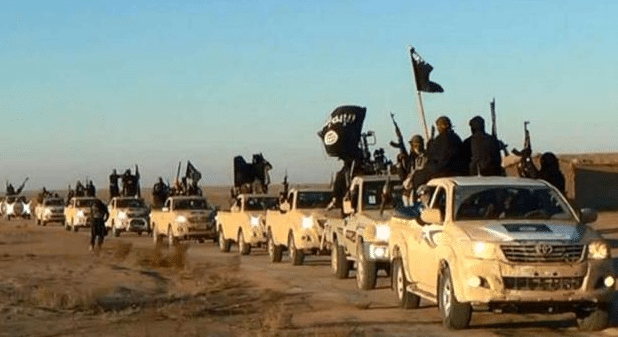
As ISIS began to register its territorial losses, it adopted a new official slogan: “Remaining and expanding” (baqiya wa’tatamaddad). And this was the catchphrase hurled defiantly at US journalists visiting the al-Hol detention camp in northern Iraq on October 28, 2019, one day after US President Donald Trump had announced the death of self-styled caliph and leader of ISIS, Abu Bakr al-Baghdadi in a US raid in Syria,
A few days later IS named its new caliph as Abu Ibrahim al-Hashimi al-Qurashi. Speculation in the media immediately ran rife. Al-Qurashi was not a name known to counter-terrorism analysts, but they are well aware of the “smoke and mirrors” tactics of jihadist groups in the matter of names, pseudonyms and noms de guerre. Attention soon focused on the man who had been al-Baghdadi’s deputy – Amir Mohammed Abdul Rahman al-Mawli, also known as al-Hajj Abdullah.
There were two apparent reasons for providing al-Mawli with a pseudonym. In the first place, there was a ransom of $5 million dollars on his head – a sum offered for his capture by the US State Department’s Rewards for Justice program. In the second, it was believed that al-Mawli did not fulfill one essential requirement for the position of caliph of the Muslim world – direct descent from the Quraysh Hashemite tribe, and thus from Muhammad himself. Only someone claiming this could be regarded universally as a legitimate caliph able to command the full support of jihadis around the world.
As for al-Mawli, he had been a religious scholar in al-Qaeda, then joined its IS off-shoot where he rose to assume a senior leadership role. In 2014 he helped organize, and then justify, the abduction, slaughter, and trafficking of the Yazidi religious minority in northwest Iraq.
Much of the Yazidi community lived in Sinjar, close to the Syrian border. After ISIS had taken Tal Afar and Mosul, the group murdered thousands of Yazidi men, and enslaved thousands of Yazidi women and children, in what the United Nations has called a genocide. A former IS operative, quoted by CNN, testified that al-Mawli, using the name al-Hajj Abdullah, played a leading role.
Now he is beginning to exploit new opportunities that have opened up for ISIS to destabilise the Western world. The Covid-19 pandemic is one such.
It is not generally known that IS publishes a weekly newsletter called Al-Naba (the Dispatch). Its purpose is to update even far-flung provinces about the group’s global campaign of violence, and to disseminate a common program to ISIS affiliates. In the March 19 edition it instructed its followers to “exploit disorder” in pandemic-weakened states.
The editorial, titled “The Crusaders’ Worst Nightmare”, points out that across the world commerce is grinding to a halt, and people are shutting themselves in their homes. The editorial suggests that this is a golden opportunity. Muslims have a duty to protect themselves and their loved ones from the coronavirus, says Al-Naba. but also to act. IS supporters are urged to liberate Muslim captives from prisons and camps; to show no mercy to the “infidels” and “apostates” in their moment of crisis, but to attack and weaken them. The best way to avoid God’s punishment, including coronavirus, it says, is through obedience and the act of obedience most beloved to God is “jihad” and inflicting pain on His enemies.
There is evidence that the call to arms has been heeded.
On April 17, with the Philippines in a month-long quarantine, IS-linked gunmen opened fire on a military convoy in the remote province of Sulu. They killed 11 troops engaged in an operation against the leader of ISIS in the Philippines. They had been tracking him since he masterminded a deadly Cathedral bombing in January 2019.
IS undertook two other attacks in April, both in countries in which they had apparently never operated before. In the Maldives, “soldiers of the caliphate” set several boats ablaze in a warning to the nation’s “apostate” government. And on April 24 Mozambique police reported a massacre of 52 villagers in the oil-rich Cabo Delgado region, an outrage claimed by a local affiliate of IS. In announcing the massacre, the Mozambique government added that it was the first time that ISIS had struck in their country,
Europe has not been spared in this flare-up of ISIS activity. On April 15, German police arrested four suspected IS members in the western state of North Rhine-Westphalia, who authorities believe were planning to attack American military facilities in the country.
Rita Katz, director of the SITE Intelligence Group which tracks online networks affiliated with jihadist and white supremacist organizations, says: ““Since the pandemic started and weakened the capacity of law or security enforcement around the world, ISIS has persisted in operations across Afghanistan, West Africa, Central Africa, the Sahel, Egypt, and Yemen.”
These attacks come on top of continued activity by IS in their heartlands of Syria and Iraq. Hit and run strikes have increased on Syrian Army positions and those of its allies near major towns along the banks of the Euphrates, and also their bases in the desert in south-eastern Syria. At the same time, ISIS has mounted offensives right across Iraq, resulting not only in Iraqi army casualties and those of allied paramilitary units, but often also claiming the lives of innocent civilians.
The UN Monitoring Team tracks the global jihadi terror threat. According to a report submitted to the UN Security Council in January, IS’s resilience is partly explained by its vast wealth. Now that the group no longer administers a large state, Its former substantial overheads have been cut right back and, said the report, according to a conservative assessment by UN member states, ISIS still has $100 million in reserves.
There is no room for complacency. IS still poses a major threat to the civilized world.

